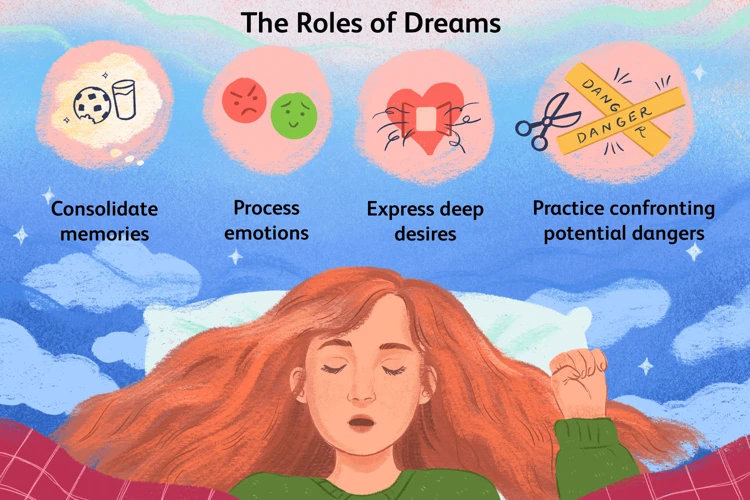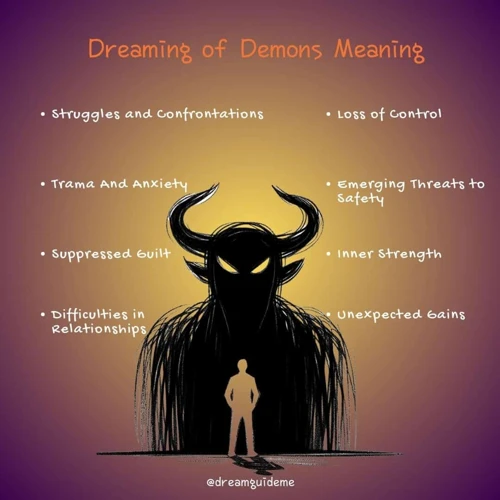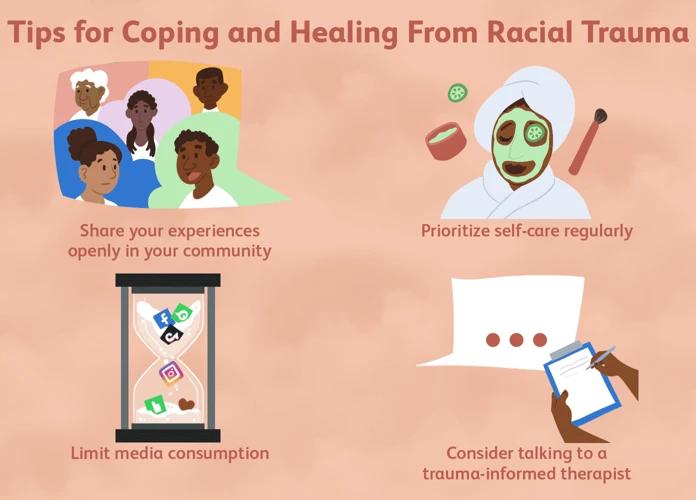More often than not, the realm of dreams remains a mysterious landscape, filled with vivid imagery and irrational narratives. However, for individuals who have experienced trauma, these nocturnal visions may take on a whole new meaning. Nightmares have been linked to the impact of trauma on the subconscious mind and can disrupt sleep patterns, causing further distress. By exploring the connection between trauma and nightmares, we can gain a deeper understanding of the psychological implications and symbolic representation hidden within these haunting dreams. We can uncover therapeutic approaches that aid individuals in coping with their trauma-related nightmares, ultimately promoting healing and restoring a sense of inner peace.
The Role of Trauma

Trauma plays a significant role in shaping the way our minds process and interpret experiences, even long after the events have occurred. The impact of trauma on the subconscious mind can be profound, often leading to the manifestation of distressing nightmares. These nightmares serve as a way for the mind to process and make sense of the traumatic events that have been endured. The subconscious mind uses symbolism and metaphors in dreams to convey hidden emotions and fears. It is through these symbolic representations that the true extent of the trauma’s impact on an individual can be uncovered. The disruption caused by trauma can also affect sleep patterns, leading to frequent waking during the night and difficulty falling back asleep. Understanding the profound role of trauma in nightmares is crucial in aiding individuals in their journey towards healing and finding resolution. (Link: sleep disorders)
1. Trauma and the Subconscious
Trauma has a profound impact on the subconscious mind, influencing the way we process and store memories. When a person experiences trauma, the mind often tries to protect itself by burying or dissociating from the distressing memories. However, these suppressed emotions and experiences can resurface during sleep, manifesting as nightmares. The subconscious mind uses dreams as a way to process and make sense of the trauma, often through symbolic representations. These symbols may be personal to the individual and may be linked to specific aspects of their traumatic experience. For example, a person who has survived a car accident may have nightmares filled with images of crashing cars or being trapped. These symbolic representations can provide valuable insights into the deeper psychological impact of the trauma. By exploring and analyzing the symbolism in these nightmares, individuals and therapists can gain a deeper understanding of the trauma’s effects and work towards healing and recovery. (Link: investigating stress nightmares)
2. Impact of Trauma on Sleep Patterns
The impact of trauma on sleep patterns is undeniable. Traumatic experiences can have a profound effect on an individual’s ability to sleep soundly, leading to a range of sleep disturbances. Here are some of the ways trauma can disrupt sleep patterns:
1. Insomnia: Trauma often triggers symptoms of insomnia, making it difficult for individuals to fall asleep or stay asleep throughout the night. Worry, anxiety, and hypervigilance can all contribute to persistent insomnia, leaving individuals feeling exhausted and unrefreshed.
2. Nightmares: Trauma-related nightmares are a common manifestation of the impact trauma has on sleep. These vivid and distressing dreams can directly relate to the traumatic experiences and can cause intense emotional distress upon waking. (Link: medication)
3. Night Sweats and Flashbacks: Trauma can also lead to physiological reactions during sleep, such as night sweats and flashbacks. Night sweats, also known as sleep hyperhidrosis, can be a result of the body re-experiencing the trauma during REM sleep. Flashbacks, on the other hand, involve intrusive memories or images from the trauma that occur during sleep and can disrupt the sleep cycle.
4. Fragmented Sleep: Trauma can disrupt the normal sleep architecture, leading to fragmented sleep patterns. Individuals may experience frequent awakenings throughout the night, making it challenging to achieve deep, restorative sleep. This fragmented sleep can further contribute to daytime fatigue and difficulties in concentration and memory.
It is important to recognize the impact trauma has on sleep patterns, as it can significantly affect an individual’s overall well-being and quality of life. By addressing and treating trauma-related sleep disturbances, individuals can improve their sleep quality and take important steps towards healing and recovery.
Unmasking Symbolism in Nightmares

In order to better understand the impact of trauma on nightmares, it is essential to unmask the symbolism embedded within these haunting dreams. Nightmares can often be seen as the mind’s way of processing and expressing deep-seated emotions and fears related to the traumatic experiences. By delving into the psychological meanings behind trauma-related dreams, we can gain valuable insights into an individual’s subconscious thoughts and feelings. These dreams may feature recurring themes or scenarios that reflect the unresolved trauma and the individual’s struggle to cope with it. It is important to approach the interpretation of these dreams with sensitivity and care, as they hold significant personal significance for the dreamer. Identifying and interpreting the symbolism in nightmares can be a key step in the healing process, as it allows individuals to confront their fears and begin to work through the trauma they have experienced.
1. Psychological Meaning behind Trauma-Related Dreams
Trauma-related dreams hold a profound psychological meaning that goes beyond their surface-level imagery. These dreams often serve as a window into the subconscious mind, allowing individuals to explore and process their traumatic experiences on a deeper level. The symbols and themes that arise in these dreams can be rich with significance, representing emotions, fears, and unresolved conflicts related to the trauma. For example, recurring nightmares of being trapped or chased may symbolize a feeling of helplessness or the constant fear of being pursued by an unseen danger. Dreams featuring disturbing scenes or graphic violence can be indicative of repressed memories or the need for catharsis. It is important to note that the interpretation of trauma-related dreams should be approached with caution, as each individual’s experiences and subconscious symbolism are unique. Consulting a mental health professional trained in trauma recovery can provide guidance and support in understanding the psychological meaning behind these dreams. By delving into the depths of trauma-related dreams, individuals can gain insight into their inner struggles, facilitating healing and the integration of traumatic experiences.
2. Common Nightmares Associated with Trauma
Common nightmares associated with trauma can vary greatly depending on the individual and the specific traumatic event they have experienced. However, there are certain themes and patterns that tend to emerge in trauma-related nightmares. These nightmares often involve re-experiencing the traumatic event in some form or another. This could manifest as vivid and distressing images related to the trauma, such as being chased, attacked, or trapped. Nightmares also commonly include feelings of helplessness, fear, and powerlessness, which are often associated with the trauma. The content of these nightmares may reflect the unresolved emotions and unresolved conflicts associated with the traumatic event. For example, a person who has experienced a car accident may have recurring nightmares of being in a similar accident or witnessing others being injured. These nightmares are symbolic representations of the trauma and serve as a way for the mind to process and make sense of the experience. By exploring and understanding the common nightmares associated with trauma, individuals can work towards addressing the underlying emotions and finding resolution.
Therapeutic Approaches for Coping
Coping with trauma-related nightmares requires a multifaceted approach that combines psychological interventions and self-care practices. Psychotherapy serves as a fundamental therapeutic approach in helping individuals process and heal from trauma. Techniques such as Cognitive Behavioral Therapy (CBT), Eye Movement Desensitization and Reprocessing (EMDR), and Exposure Therapy are commonly utilized to address the underlying causes of nightmares and reduce their frequency. Another effective approach is keeping a dream journal, which allows individuals to explore the symbolism and emotions within their dreams, promoting self-reflection and understanding. Additionally, practicing relaxation techniques, such as deep breathing exercises or progressive muscle relaxation, can help alleviate anxiety and promote a more restful sleep. Implementing good sleep hygiene practices, such as maintaining a consistent sleep schedule and creating a calming bedtime routine, can also contribute to better sleep quality and reduce the occurrence of nightmares. Incorporating these therapeutic approaches into one’s journey towards healing can have a profound impact on reducing the distress caused by trauma-related nightmares.
1. Psychotherapy and Trauma Processing
Psychotherapy is a vital therapeutic approach for individuals who have experienced trauma and are struggling with the impact of their nightmares. Through various techniques and modalities, psychotherapy provides a safe and supportive environment for trauma processing and healing. One commonly used approach is cognitive-behavioral therapy (CBT), which aims to identify and challenge negative thought patterns and beliefs related to the trauma. By addressing these cognitive distortions, individuals can gain a new perspective on their experiences and reduce the distress associated with their nightmares. Eye movement desensitization and reprocessing (EMDR) is another effective therapy that targets traumatic memories and helps individuals process and integrate them into their lives in a healthier way. This therapy involves guided eye movements or other forms of bilateral stimulation, facilitating the reprocessing and resolution of traumatic experiences. Additionally, therapists may employ techniques such as trauma-focused therapy, narrative therapy, or psychodynamic therapy to explore and confront the underlying issues contributing to the nightmares. The guidance and insight provided by skilled therapists can empower individuals to navigate their trauma-related nightmares and ultimately find a sense of peace and resolution.
2. Dream Journaling and Self-Reflection
Dream journaling and self-reflection are powerful therapeutic approaches to help individuals cope with the impact of trauma on their nightmares. Keeping a dream journal allows individuals to document their dreams immediately upon waking, capturing the vivid details, emotions, and symbolism present in their nightmares. This process creates an opportunity for self-reflection and analysis, offering insights into the underlying psychological meaning behind the trauma-related dreams. By reviewing their dream journal over time, individuals can identify recurring themes or patterns that may provide clues about unresolved trauma or emotions that need to be addressed. Additionally, self-reflection encourages individuals to explore their emotions and reactions to the nightmares in a safe and controlled setting. It allows for the identification and examination of triggers or subconscious associations tied to the traumatic experiences. Engaging in self-reflection reinforces self-awareness and empowers individuals on their journey to healing. (Link: therapeutic approaches for coping)
3. Relaxation Techniques and Sleep Hygiene
Relaxation techniques and sleep hygiene practices are valuable therapeutic approaches for individuals struggling with trauma-related nightmares. These techniques aim to create a calming and conducive environment for restful sleep, while also managing the overall stress levels that can contribute to the frequency and intensity of nightmares.
One effective relaxation technique is progressive muscle relaxation. This involves consciously tensing and then releasing different muscle groups, promoting physical and mental relaxation. By focusing on the sensations and release of tension, individuals can alleviate anxiety and create a sense of calm before sleep.
Engaging in activities that promote relaxation, such as deep breathing exercises or guided imagery, can also be beneficial. Deep breathing exercises help regulate the body’s stress response, promoting a state of relaxation. Guided imagery involves visualizing peaceful and positive scenes that help distract the mind from intrusive thoughts and promote a sense of serenity.
Creating a sleep-friendly environment is equally important. This includes maintaining a consistent sleep schedule, ensuring a comfortable sleeping environment with minimal distractions, and implementing a relaxing pre-sleep routine. Establishing a bedtime routine that incorporates calming activities, such as reading a book or taking a warm bath, can signal to the body that it is time to unwind and prepare for sleep.
Additionally, practicing good sleep hygiene habits can greatly improve the quality of sleep. This includes avoiding stimulating activities and substances before bed, such as caffeine and electronic devices. The use of soft lighting, calming scents, and comfortable bedding can also contribute to a more restful sleep environment.
By incorporating relaxation techniques and implementing sleep hygiene practices, individuals can create a more peaceful and supportive sleep environment, reducing the likelihood and intensity of trauma-related nightmares. These techniques not only have a direct impact on sleep quality but also assist in overall stress reduction and emotional well-being.
Conclusion
In conclusion, the impact of trauma on nightmares is a complex and multifaceted topic that requires careful attention and understanding. The connection between trauma and nightmares is undeniable, as trauma can deeply affect the subconscious mind, leading to the manifestation of distressing dreams. Through these nightmares, individuals may relive traumatic experiences and grapple with unresolved emotions and fears. Unmasking the symbolism within these dreams can provide invaluable insights into the psychological implications of trauma. Fortunately, there are therapeutic approaches available to aid individuals in coping with their trauma-related nightmares. Psychotherapy and trauma processing can provide a safe space for individuals to explore and resolve their traumatic experiences. Dream journaling and self-reflection offer a means of gaining insight and understanding into the deeper meaning behind these nightmares. Additionally, relaxation techniques and practicing good sleep hygiene can promote better sleep and reduce the frequency and severity of nightmares. By addressing the impact of trauma on nightmares and providing support and intervention, individuals can find healing, resolution, and ultimately regain a sense of peace. It is essential to seek professional help when dealing with trauma and its effects, as trained professionals can offer guidance and strategies to navigate the recovery process.
Frequently Asked Questions
1. How does trauma impact our dreams?
Trauma can significantly impact our dreams by infiltrating the subconscious mind. It can trigger distressing dreams and nightmares, often filled with vivid and intense imagery related to the traumatic event.
2. Can trauma-related nightmares affect our sleep patterns?
Absolutely. Trauma-related nightmares can disrupt sleep patterns by causing frequent awakenings throughout the night, making it difficult to achieve restful sleep. This can result in fatigue, insomnia, and further emotional distress.
3. What is the psychological meaning behind trauma-related dreams?
Trauma-related dreams often carry psychological meanings hidden within their symbolism. These dreams allow the subconscious mind to process and make sense of the traumatic event, express repressed emotions, and help the individual work towards resolution and healing.
4. What are some common nightmares associated with trauma?
Common nightmares associated with trauma can include reliving the traumatic event, experiencing intense fear, being chased or attacked, feeling trapped or helpless, or encountering symbols related to the traumatic experience.
5. How can psychotherapy and trauma processing help in coping with trauma-related nightmares?
Psychotherapy and trauma processing techniques, such as cognitive behavioral therapy (CBT) and Eye Movement Desensitization and Reprocessing (EMDR), can assist individuals in addressing and resolving the underlying trauma. This, in turn, can help reduce the frequency and intensity of trauma-related nightmares.
6. How does dream journaling and self-reflection aid in coping with nightmares?
Dream journaling involves recording dreams in detail and reflecting on their potential meanings. This practice helps individuals gain insights into their trauma-related nightmares, connect with their emotions, and identify patterns or triggers that can be addressed in therapy.
7. What are relaxation techniques that can promote better sleep and reduce nightmares?
Relaxation techniques, such as deep breathing exercises, progressive muscle relaxation, guided imagery, and mindfulness meditation, can help reduce anxiety and promote better sleep hygiene. These techniques can be particularly beneficial in managing trauma-related nightmares.
8. How does sleep hygiene impact the occurrence of nightmares?
Good sleep hygiene practices, such as maintaining a consistent sleep schedule, creating a calm and comfortable sleep environment, and avoiding stimulating activities before bedtime, can promote better sleep quality and contribute to a reduction in nightmares.
9. Can medication help with trauma-related nightmares?
Medications can sometimes be prescribed to help manage the symptoms of trauma-related nightmares. However, it is essential to discuss the potential benefits and side effects with a healthcare professional to determine the most appropriate course of treatment.
10. Should trauma survivors seek professional help for their nightmares?
Yes, seeking professional help, such as therapy or counseling, is highly recommended for trauma survivors experiencing distressing nightmares. A trained professional can provide guidance, support, and evidence-based techniques to address and process the trauma, ultimately aiding in the reduction of nightmares and promoting healing.








